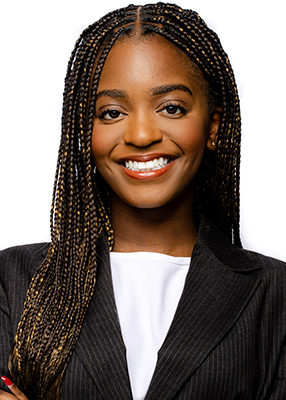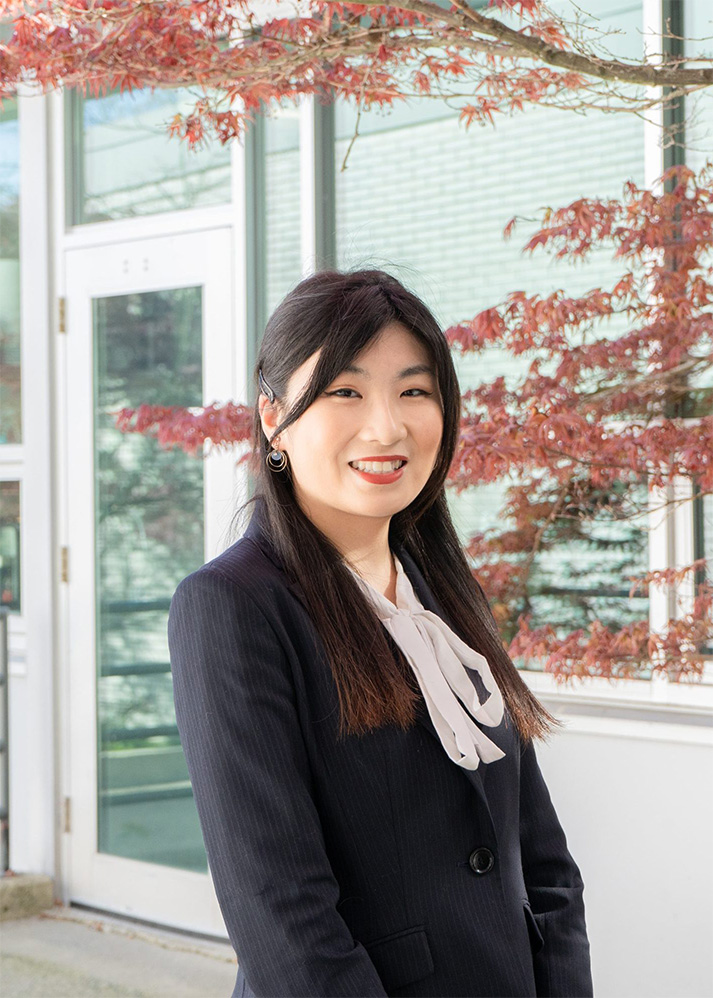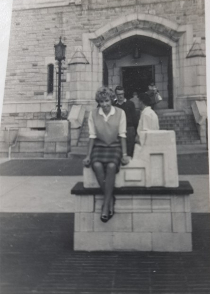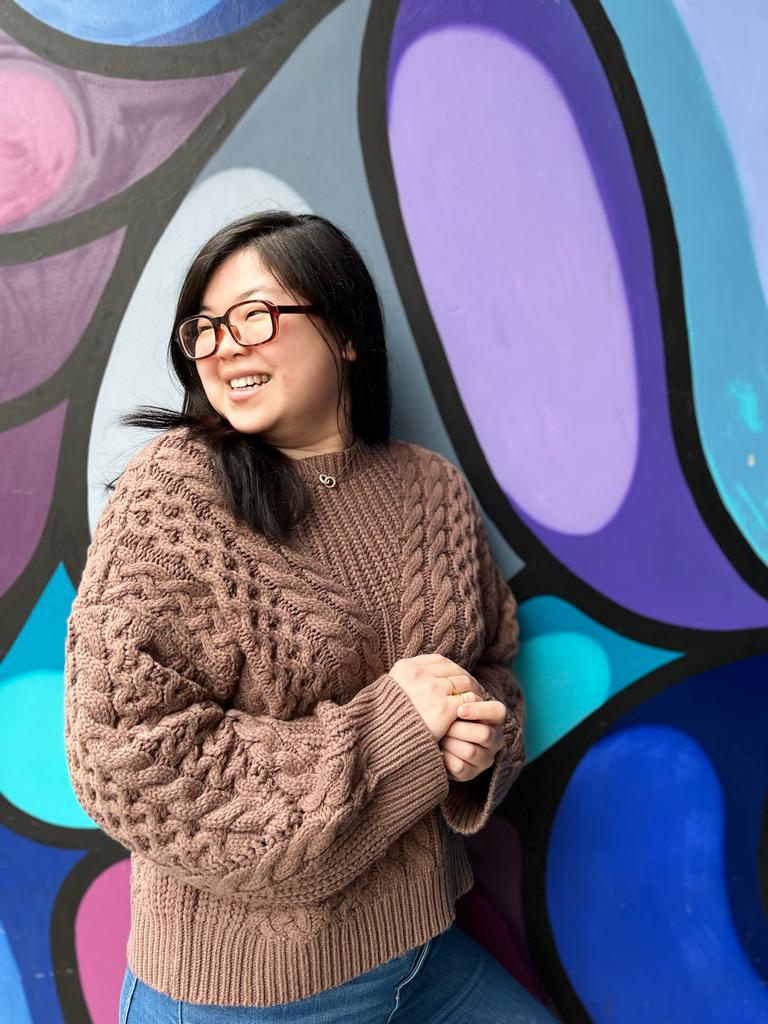Melanie Mpanju

What were some of your most meaningful experiences at UBC?
I can’t think of one moment in particular, but a lot of my most meaningful experiences are thanks to my amazing friends that I made at UBC. I was so lucky to have met such strong, intelligent, and supportive women of color that made all of my experiences at UBC so memorable. One of my favorite memories was during final exam season. My friends and I got a huge table at IKB Library the night before our exam. We ended up eating dinner there, studying, taking naps, eating breakfast the next morning, and enjoying each other’s company all in one sitting. Even though we were all exhausted and studying hard, we were still laughing and keeping each other motivated throughout the whole night. I’m grateful to be walking away from UBC with lifelong friends by my side.
What was your first job after graduation and what other jobs did you have before your current position?
My first job after graduation (and my current job) is working as a Staff Assistant on Capitol Hill. In this role, I primarily handle all outgoing correspondence for my committee. Some key tasks include reviewing and editing briefing memorandums, witness invitations in preparation for congressional hearings, and other committee documents. Most of the previous jobs that I had were also policy-related. My first internship was at the Global Green Growth Institute in Seoul, South Korea. In this role, I conducted a lot of research analysis on electric mobility in the Asia-Pacific region. My second internship was at the Trade and Development Bank in Nairobi, Kenya where I looked at international development in the Sub-Saharan Africa region. Finally, my last internship was with the Congressional Black Caucus Foundation based in Washington D.C. I also worked at UBC as a Research Assistant in the Peter A. Allard Law School (focusing on anti-Black racism), a Teaching Assistant in the Political Science Department, and an Orientation Leader.
Is your current career path as you originally intended? What challenges did you face in launching your career?
My current path is definitely what I have always aspired to do. I have always been very passionate about social and systemic change, especially as it pertains to Black and Brown communities. I knew that one day I wanted to come back to Washington D.C., where I was born, and get involved in public policy. However, launching my career after graduation was definitely challenging. It was difficult navigating the job search world and trusting the process. I was fortunate enough to have built strong relationships with my professors like Dr. Kim Snowden and Dr. Yves Tiberghien, to name a few. My professors inspired me to pursue career paths that catered to my interests and provided me with the confidence that I needed when entering the workforce. As someone who used to be shy to talk to my professors in first year, it genuinely helped me in more ways than one.
What do you like about your current job and what do you find challenging? How does it relate to your degree?
I love that my current job always keeps me on my toes. The committee that I am working on, especially, covers so many policy areas. I learn something new every day and I have a great team of colleagues that I am fortunate enough to work with. I have also been enjoying expanding my connections through networking events in D.C. as well. It’s been a bit challenging transitioning from going to school every day to working every day. The work world is definitely very different, but I am so thankful that I enjoy what I am doing and I can utilize the skills that I learned in my Political Science program.
What advice would you give to students and alumni interested in breaking into your industry?
I think it’s really important to remain true to your passion and interests. I decided to follow this career path because I am very passionate about systemic change, and advocating for intersectional and marginalized communities. During my job search, I made a conscious effort to find a position that would allow me to pursue my goals instead of finding a position for the sake of having a job. I really want to feel like I am making a difference in this world and I am living true to my purpose. It’s also important to remember that the perfect position is out there for you. Our generation has so much to offer in the political and legal space, so don’t be afraid to go for it!
Melanie Mpanju



What were some of your most meaningful experiences at UBC?
I can’t think of one moment in particular, but a lot of my most meaningful experiences are thanks to my amazing friends that I made at UBC. I was so lucky to have met such strong, intelligent, and supportive women of color that made all of my experiences at UBC so memorable. One of my favorite memories was during final exam season. My friends and I got a huge table at IKB Library the night before our exam. We ended up eating dinner there, studying, taking naps, eating breakfast the next morning, and enjoying each other’s company all in one sitting. Even though we were all exhausted and studying hard, we were still laughing and keeping each other motivated throughout the whole night. I’m grateful to be walking away from UBC with lifelong friends by my side.
What was your first job after graduation and what other jobs did you have before your current position?
My first job after graduation (and my current job) is working as a Staff Assistant on Capitol Hill. In this role, I primarily handle all outgoing correspondence for my committee. Some key tasks include reviewing and editing briefing memorandums, witness invitations in preparation for congressional hearings, and other committee documents. Most of the previous jobs that I had were also policy-related. My first internship was at the Global Green Growth Institute in Seoul, South Korea. In this role, I conducted a lot of research analysis on electric mobility in the Asia-Pacific region. My second internship was at the Trade and Development Bank in Nairobi, Kenya where I looked at international development in the Sub-Saharan Africa region. Finally, my last internship was with the Congressional Black Caucus Foundation based in Washington D.C. I also worked at UBC as a Research Assistant in the Peter A. Allard Law School (focusing on anti-Black racism), a Teaching Assistant in the Political Science Department, and an Orientation Leader.
Is your current career path as you originally intended? What challenges did you face in launching your career?
My current path is definitely what I have always aspired to do. I have always been very passionate about social and systemic change, especially as it pertains to Black and Brown communities. I knew that one day I wanted to come back to Washington D.C., where I was born, and get involved in public policy. However, launching my career after graduation was definitely challenging. It was difficult navigating the job search world and trusting the process. I was fortunate enough to have built strong relationships with my professors like Dr. Kim Snowden and Dr. Yves Tiberghien, to name a few. My professors inspired me to pursue career paths that catered to my interests and provided me with the confidence that I needed when entering the workforce. As someone who used to be shy to talk to my professors in first year, it genuinely helped me in more ways than one.
What do you like about your current job and what do you find challenging? How does it relate to your degree?
I love that my current job always keeps me on my toes. The committee that I am working on, especially, covers so many policy areas. I learn something new every day and I have a great team of colleagues that I am fortunate enough to work with. I have also been enjoying expanding my connections through networking events in D.C. as well. It’s been a bit challenging transitioning from going to school every day to working every day. The work world is definitely very different, but I am so thankful that I enjoy what I am doing and I can utilize the skills that I learned in my Political Science program.
What advice would you give to students and alumni interested in breaking into your industry?
I think it’s really important to remain true to your passion and interests. I decided to follow this career path because I am very passionate about systemic change, and advocating for intersectional and marginalized communities. During my job search, I made a conscious effort to find a position that would allow me to pursue my goals instead of finding a position for the sake of having a job. I really want to feel like I am making a difference in this world and I am living true to my purpose. It’s also important to remember that the perfect position is out there for you. Our generation has so much to offer in the political and legal space, so don’t be afraid to go for it!



